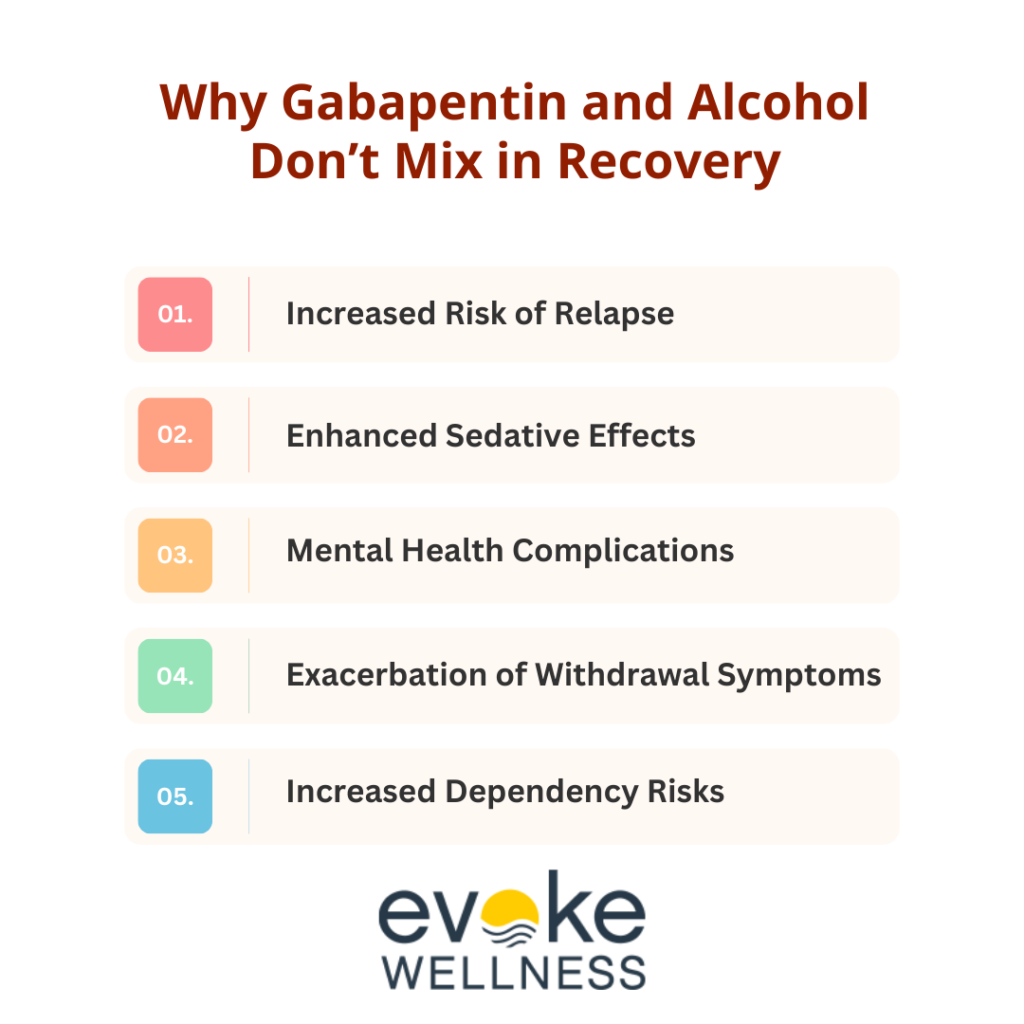Gabapentin is a medication frequently prescribed for conditions such as nerve pain, seizures, and anxiety disorders. While gabapentin is generally considered safe when used as directed by a healthcare provider, the potential risks increase significantly when combined with alcohol. This interaction can be particularly dangerous for individuals in recovery from substance use disorders or those undergoing treatment in substance abuse treatment programs. Understanding the potential hazards of mixing gabapentin with alcohol is crucial, especially for those committed to their sobriety and mental health.
How Gabapentin Works
Gabapentin primarily affects the brain by altering neurotransmitter activity, which helps reduce seizures, alleviate nerve pain, and manage anxiety or mood disorders. Though not classified as a controlled substance, gabapentin has gained attention for its sedative effects, especially when combined with other central nervous system depressants like alcohol.
Alcohol, on the other hand, depresses the central nervous system, slowing brain function and affecting motor skills, coordination, and judgment. When alcohol is consumed alongside gabapentin, the combined effect of these substances can lead to serious consequences. Those participating in alcohol addiction rehab or a similar addiction treatment program should be especially cautious about this combination.
Risks of Mixing Gabapentin and Alcohol
1. Profound Sedation and Impairment
Both gabapentin and alcohol can cause drowsiness, but when used together, the sedative effects are significantly amplified. This combination may lead to excessive drowsiness, dizziness, and severe cognitive impairment. Even small amounts of alcohol can drastically increase gabapentin’s sedative effects, which may result in loss of coordination, difficulty walking, confusion, and impaired motor functions. These symptoms are particularly concerning for individuals in recovery, as they undermine the ability to engage effectively in substance abuse treatment programs or manage the responsibilities of daily life.
This increased impairment can make it harder for those undergoing treatment in cognitive-behavioral therapy programs or dialectical behavior therapy programs to implement the strategies they’ve learned to cope with stress, cravings, or emotional dysregulation, further jeopardizing their recovery.
2. Increased Risk of Overdose
One of the most significant dangers of combining gabapentin with alcohol is the heightened risk of overdose. Both substances depress the central nervous system, leading to slow and shallow breathing, reduced heart rate, and loss of consciousness. In severe cases, this can lead to coma or even death. Individuals who are in or have recently completed an alcohol detox or addiction treatment program are at even greater risk, as their tolerance to substances like alcohol has often diminished, making them more susceptible to the sedative effects of these drugs.
Moreover, individuals in recovery from substance use disorders may mistakenly believe that gabapentin is a safe alternative to other controlled substances. When alcohol is added to the mix, this false sense of security can lead to unintentional overdose, a risk that emphasizes the importance of professional care, such as that provided at an addiction treatment center in San Marcos, TX.
3. Compounding Mental Health Issues
For individuals with co-occurring mental health and substance use disorders, mixing gabapentin with alcohol can further complicate their condition. Gabapentin is often prescribed to manage anxiety, depression, and other mood disorders. However, alcohol is a depressant that can worsen symptoms of anxiety and depression, counteracting the benefits of gabapentin. This can lead to increased mood instability, irritability, or depressive episodes, making it more difficult to manage mental health effectively.
Those enrolled in a dual diagnosis treatment program, where both mental health and substance use disorders are addressed simultaneously, are especially vulnerable to the adverse effects of this combination. Alcohol can negate the therapeutic effects of medications like gabapentin, making it harder to achieve stability in treatment. Moreover, individuals in these programs might experience increased feelings of hopelessness or frustration, which can trigger relapse.
4. Increased Risk of Relapse
Consuming alcohol while taking gabapentin can also significantly increase the risk of relapse for individuals in recovery. Alcohol consumption lowers inhibitions and impairs decision-making, making it more likely for someone to give in to cravings or engage in risky behavior, including using other substances. Even a single drink can make it harder for individuals in alcohol addiction treatment programs to resist the urge to consume more alcohol or other substances, undoing progress made in recovery.
Alcohol can also interfere with the therapeutic interventions learned in addiction therapy programs, such as those focusing on behavioral change and emotional regulation. For individuals who have recently completed detox or those still in recovery, the risk of slipping back into old habits is magnified when alcohol is mixed with medications like gabapentin.
Why Gabapentin and Alcohol Don’t Mix in Recovery
For individuals actively working to overcome alcohol or substance use disorders, combining gabapentin with alcohol is particularly dangerous. Recovery often requires a period of physical healing, where the body and brain adjust to functioning without substances. Introducing alcohol while taking gabapentin can reverse this healing process, leading to increased dependency on substances and a greater likelihood of relapse.
Moreover, the recovery process is typically supported by substance abuse treatment programs that emphasize sobriety and the development of healthier coping mechanisms. Alcohol use can disrupt these efforts, reducing the effectiveness of cognitive-behavioral therapy programs, dialectical behavior therapy programs, and other therapeutic interventions designed to promote long-term recovery.
Professional Support is Key
If you or a loved one is prescribed gabapentin and struggling with alcohol use, it’s essential to seek help from professionals. A comprehensive addiction treatment program or alcohol addiction rehab can provide medical supervision, therapy, and support to manage both gabapentin use and alcohol cravings. For those at greater risk of relapse or overdose, an alcohol detox center offers medically assisted detoxification to ensure a safe withdrawal from alcohol and other substances.
Additionally, those with co-occurring mental health disorders can benefit from enrolling in a dual diagnosis treatment program, where the complex relationship between mental health and substance use is addressed holistically. At Evoke Wellness at San Marcos, we offer specialized care at our addiction treatment center in Texas, providing individualized treatment plans that cater to the unique needs of each person in recovery.
Conclusion
Gabapentin can be a helpful medication when used correctly, but combining it with alcohol introduces severe risks, especially for those in recovery. The potential for overdose, increased impairment, and mental health complications makes this combination particularly dangerous. If you or someone you love is navigating recovery and prescribed gabapentin, it is crucial to avoid alcohol and seek professional support. At Evoke Wellness at San Marcos, our addiction treatment center in San Marcos, TX offers comprehensive treatment services, including alcohol detox, addiction therapy programs, and dual diagnosis treatment programs, ensuring you have the support you need for lasting recovery. Together, let’s embrace the journey to recovery and the promise of a new beginning. Call us at (833) 503-0734 today or reach out online.
FAQ About Can You Drink on Gabapentin? Risks and Considerations
What happens if you drink alcohol while taking gabapentin?
Drinking alcohol while taking gabapentin can lead to extreme drowsiness, dizziness, and impaired motor skills. Both substances are central nervous system depressants, so combining them increases the risk of overdose, respiratory depression, and other severe health risks.
Why is mixing alcohol and gabapentin risky for individuals in recovery?
For individuals in recovery from alcohol or substance use, mixing alcohol and gabapentin can increase the risk of relapse, impair judgment, and make it harder to engage in treatment programs. Alcohol can also counteract the therapeutic effects of gabapentin, especially for those managing mental health conditions.
Can you overdose on gabapentin and alcohol?
Yes, combining gabapentin with alcohol can increase the risk of overdose. Both substances depress the central nervous system, which can slow breathing, heart rate, and lead to unconsciousness or even death.
Can gabapentin affect your alcohol detox process?
Yes, gabapentin can interfere with the detox process. It can slow down recovery progress and create additional health risks, especially during alcohol withdrawal. Those in an alcohol detox center or undergoing detox should consult their healthcare provider before taking gabapentin.
Should I avoid alcohol if I am taking gabapentin for mental health or nerve pain?
Yes, it is best to avoid alcohol when taking gabapentin, as alcohol can worsen mental health symptoms and amplify the side effects of the medication. This is especially important for individuals enrolled in substance abuse treatment programs or managing co-occurring disorders.
What should I do if I’m prescribed gabapentin but have a history of alcohol use disorder?
If you have a history of alcohol use disorder, speak with your healthcare provider before starting gabapentin. They can help you weigh the benefits and risks and may recommend alternative treatments. Enrolling in an addiction treatment program may also provide the necessary support to manage both alcohol cravings and medication.
Can a professional addiction treatment program help me manage gabapentin and alcohol use?
Yes, professional treatment programs, such as those offered at Evoke Wellness at San Marcos, can help you safely manage both gabapentin use and alcohol cravings. Programs like dual diagnosis treatment programs and addiction therapy programs offer comprehensive care for individuals struggling with substance use and mental health issues.



